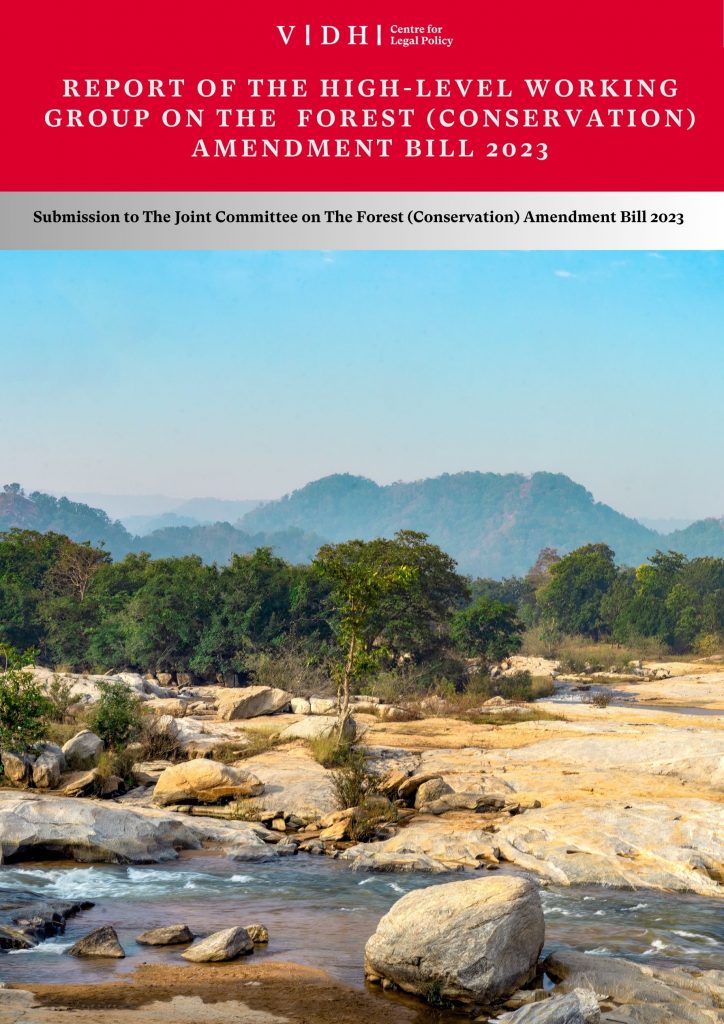
Survey on the Forest (Conservation) Amendment Bill, 2023 [Expired]

Vidhi is conducting an online stakeholder consultation on the Forest (Conservation) Amendment Bill 2023 in partnership with CIVIS. Vidhi will use the inputs received in its independent submission to the Joint Committee on Forest (Conservation) Amendment Bill 2023. The last date for submissions is May 15, 2023.
The Forest (Conservation) Amendment Bill, 2023 is a proposed legislation aimed at amending the Forest (Conservation) Act, 1980, with the objective of promoting sustainable development while conserving India’s forests and biodiversity. The Bill was introduced in the Lok Sabha on 29th March 2023 and has been referred to a 31-member Joint Parliamentary Committee (JPC), which is expected to submit its report during the Monsoon session of the Parliament (July 2023).
The bill proposes to amend the extent of applicability and non-applicability of the Act to certain types of lands. Further, it exempts a vast tract of forest lands from the requirement of forest clearance (permission under section 2 of the Act).
Here are some of the key points in the Forest (Conservation) Amendment Bill, 2023:
1. Preamble: The bill adds a new preamble to the Forest (Conservation) Act, 1980, which recognizes the importance of forests for achieving national targets of net-zero emissions and maintaining ecological balance, cultural and traditional values of forests, and facilitating economic needs and carbon neutrality.
2. Definition of Forest Land: The amendment Bill seeks to limit the definition of forest land only to include land recorded as ‘forest’ as on or after 25th October 1980, thus creating an exception to the T.N Godavarman vs Union of India judgment dated 12.12.1996 of the Supreme Court which interpreted the ‘forest’ with reference to its dictionary meaning, and specifically stated that any land which is recorded as ‘forest’ in any government record will also require ‘forest clearance’. There was no exception to this order either in terms of ownership or date.
The Bill proposes that only those forest lands that are notified as forests under law, and those recorded as forests in any government record as on or after 25 October 1980 will be regulated under the principal Act. Experts have shown concern that this limits the applicability of the Act on a vast tract of forest land in a country that got protection since the Godavarman order. Such exclusions of forest land can, therefore, potentially be sold, diverted, cleared, felled, utilised, or exploited without any forest clearance.
3. Exemption of Certain Land: The bill exempts certain categories of land from the provisions of the Act. This includes forests along rail and road infrastructure of up to 0.10 hectares; forests within 100 kilometers of the international border/ LAC/ LOC proposed to be used for the construction of strategic linear projects of national importance and concerning national security; forest lands up to 10 hectares to be used for security-related infrastructure and forest land for establishments of defence and paramilitary forces, and public utility projects on forest land. These forest lands, by default, are now excluded from the requirement of permission under Section 2 under the FCA.
Exemptions from the requirement of forest clearance would mean that there will be no impact assessment or any kind of regulatory oversight on the loss of habitats and species. There will be no requirement to undertake any site-specific mitigation plan to offset damages caused to the particular site. The usage of forest land for purposes like ‘security-related infrastructure’ and ‘public utility’ has not been defined by the Bill and can be used to establish a variety of infrastructure projects on forest lands without applying for forest clearance.
4. Assignment of Forest Land: The amendment gives wide power to the central government to prescribe terms and conditions for the assignment of forest land by way of lease or otherwise to any party by the state government.
5. Expanding the Definition of “non-forest purpose”: The amendment also redefines the ambit of “non-forest purpose” exemptions under section 2 of the FCA. The ‘non-forest purpose’ exemption allows the enumerated activities to be carried out on the forest land without prior approval of the central government. The list of exemptions now additionally includes ‘silviculture’, the establishment of a zoo/safari, ‘ecotourism facilities’ included in the Forest Working Plan/Wildlife Management Plan/Tiger Conservation Plan; or ‘any other like purposes’ ordered/ specified by the Centre.
Non-forest activities come at the cost of native vegetation and wildlife habitat. Establishment of a zoo, safaris, and ecotourism facilities can significantly disturb the forest ecosystem and alter the topography. Allowing zoos and safaris within the scope of non-forest activities may disproportionately commercialize forests and wildlife without considering the rights of forest-dependent people, wildlife habitats, and ecosystem services. The Bill also proposes to allow forests to be used for “any other like purposes” specified by the central government” which gives broad discretionary powers to the central government.
6. Limiting the scope of non-forest activities: The bill also intends to limit the definition of non-forest activities like surveys, reconnaissance, prospecting, investigation, or exploration, including seismic survey, which currently requires forest clearance. Such exemptions are currently granted case-by-case basis, depending on the underlying project and its implications on the forest and associated wildlife.
7. Implementation of the Act: The Bill proposes adding a new section to the Act that allows the Central Government to issue directions to any authority under the Central or State/Union Territory administration or recognised by them for the “implementation of the Act”.
The Joint Committee on Forest (Conservation) Amendment Bill, 2023 has invited public comments from 3rd May to 18th May.
We will be happy to receive any other inputs on the subject.
Do reach out to us at the following email address for any further comments or discussion: environment@vidhilegalpolicy.in.




